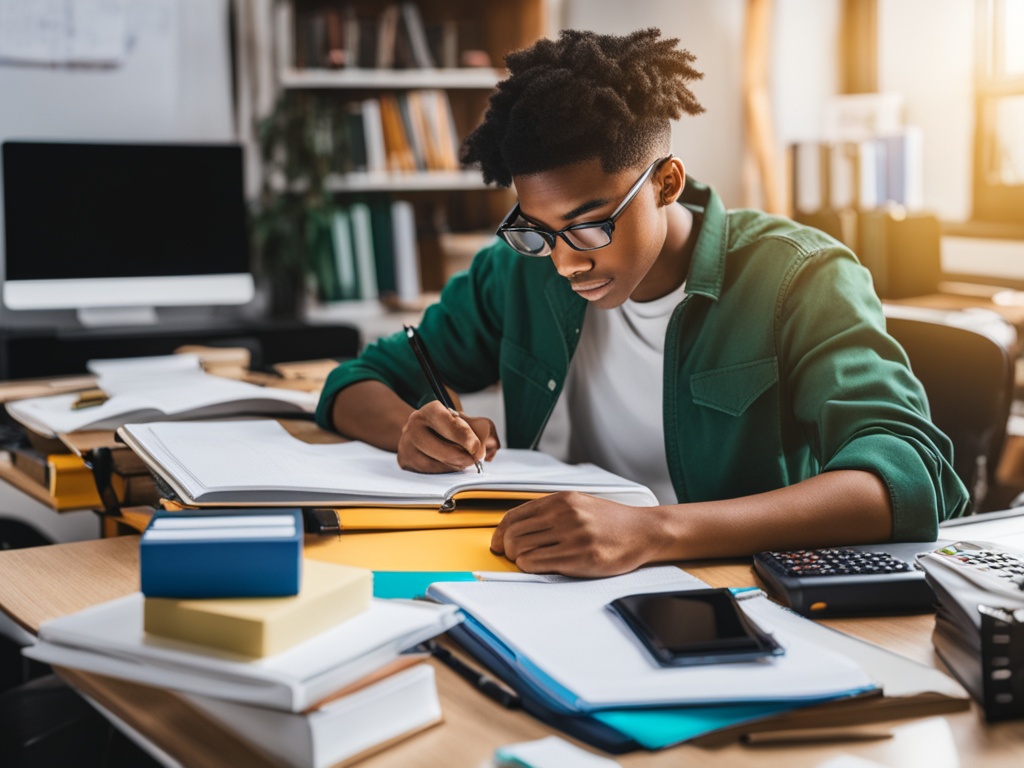
Exam Preparation: Success Tips for Students
Getting ready for an exam is key for students aiming for top grades. This guide will help you boost your chances of doing well. It covers strategies, techniques, and lifestyle tips for success.

Learn how to manage your time and improve your study habits. You’ll find out how to make a study plan and set up a good study space. Discover ways to take better notes and remember important info easily.
This guide also shares tips to beat test anxiety with relaxation and positive thoughts. It shows how eating right, exercising, and sleeping well can help you do better in school.
By the end, you’ll have the skills and knowledge to face exams with confidence. Start this exam prep journey and reach your academic goals.
Effective Time Management Strategies
Mastering time management is key to doing well in exams. By making a study plan and focusing on what’s important, students can use their time wisely. This helps them work more efficiently and be more productive.
Creating a Study Schedule
Having a set study schedule is vital for handling school work and avoiding distractions. Begin by looking at your daily habits and finding times you can study. Set aside specific times for each subject to keep your studies balanced.
- Make regular study sessions, even if they’re short, to keep moving forward.
- Add breaks and fun activities to avoid getting too tired and keep you motivated.
- Change your schedule if needed to fit in unexpected things or changes in your life.
Prioritizing Tasks
When time is short, it’s important to focus on what’s most important. Find the key assignments, projects, and study areas, and use your time for them. This keeps you on track and makes your study time count.
- Use a to-do list or a task system to keep up with what you need to do.
- Sort tasks by how important and urgent they are, and do the most urgent ones first.
- Drop or give tasks to others if they’re not about your exams.
Using these time management tips can make studying smoother, reduce distractions, and boost your chances of doing well on your exams.

Developing Study Habits
Building good study habits is key to doing well in school. You can study at home, in the library, or on your phone. The right study spot can really help you focus and get more done.
Finding the Right Study Environment
Looking for the perfect study spot means avoiding distractions and staying focused. Think about these things when picking where to study:
- Minimize Noise: Pick a quiet spot away from loud places or things like TVs, music, or talking.
- Adequate Lighting: Make sure your study area has enough light, preferably from the sun, to keep your eyes happy and you alert.
- Comfortable Seating: Choose a chair and desk that support good posture and help you stay focused for a long time.
- Declutter and Organize: Keep your study area clean and easy to get to, so you don’t get sidetracked by mess.
With a great study spot, you can improve your study habits and learn better.

Mastering Note-Taking Techniques
Effective note-taking is key to doing well in exams. This part covers different strategies to help you capture important info, organize your notes, and review them for better understanding and memory.
The Cornell method is a top choice for note-taking. It splits your page into three parts: a main note area, a cue column, and a summary section. This setup helps you spot main ideas, key points, and important details easily. It makes reviewing and recalling info simpler.
Mind mapping is another great technique. It lets you draw a diagram that links related ideas and details. This visual method helps you see how different parts connect. It makes remembering and understanding the material easier.
- Outlining is also a solid strategy. It organizes your notes with headings, subheadings, and bullet points. This helps sort and prioritize the info.
- It’s important to actively engage with the material, not just write it down. Listen, summarize, and connect the info to what you know.
Getting good at note-taking takes time, but it’s worth it. With practice, you’ll be ready for exams with confidence and success.

Overcoming Test Anxiety
Getting ready for exams can be really stressful and anxious. This stress can actually make it harder to do well in school. But, there are ways to handle test anxiety and stay focused and strong during exams.
Relaxation Exercises
Relaxation exercises are a big help in beating test anxiety. They help calm you down and make you feel in control before and during the exam. Here are some relaxation exercises you can try:
- Deep breathing: Take slow, deep breaths to oxygenate the body and induce a state of relaxation.
- Progressive muscle relaxation: Systematically tense and release different muscle groups to release physical tension.
- Visualization: Imagine a peaceful, calming scene to shift the mind away from anxious thoughts.
Positive Self-Talk
Positive self-talk is a strong way to fight test anxiety. By changing negative thoughts to positive and empowering ones, students can feel more confident and strong. Here are some positive things to say to yourself:
- “I am well-prepared for this exam and I trust in my abilities.”
- “I have overcome challenges before, and I will succeed this time as well.”
- “I am capable of remaining calm and focused during the test.”
Using relaxation exercises and positive self-talk can really help you deal with test anxiety. This way, you can face exams with a fresh, positive mindset.
Exam Preparation Tips
Getting ready for an exam is more than just looking at your notes. You need to know the exam’s layout and practice well to do well.
Understanding the Exam Format
Before the exam, look over the exam’s structure and what topics will be covered. See what kinds of questions you’ll face, like multiple-choice, short-answer, or essay. Knowing this helps you plan how to tackle each question.
Exam Preparation: Practice Tests and Review
- Practice tests are key for getting ready. Do tests that are similar to the real thing, paying attention to how long they are and what kinds of questions they ask.
- After each practice test, check your answers and see where you need more work. This shows you what you’re good at and where you need to improve.
- Regular practice and reviewing will make you more confident and familiar with the exam format. This increases your chances of doing well.

By getting to know the exam format and practicing, you can make good strategies to do your best on the exam day. Being proactive in preparing helps you feel confident and reach your goals.
Exam Preparation: Boosting Memory and Concentration
Remembering and recalling information is key to doing well on exams. This part talks about ways to improve your memory and focus. We’ll look at the benefits of mnemonics and other memory aids.
Unlocking the Power of Mnemonics
Mnemonics are smart ways to help your brain remember things better. They turn hard-to-remember facts into something easy to recall. Using pictures, rhymes, or acronyms, you can make boring facts stick in your mind.
For example, the HOMES mnemonic helps you remember the Great Lakes: Huron, Ontario, Michigan, Erie, and Superior. Making your own mnemonics can really help improve your memory techniques for exams.
Concentration Boosters and Memory Aids
There are also concentration boosters and memory aids to help you do better. Tools like mind maps, flashcards, the Pomodoro technique, and active reading can keep you focused and help you remember more. These can make a big difference in your exam scores.
- Mind maps: They help you see and connect ideas better, making it easier to remember and understand.
- Flashcards: These are handy study tools that let you quickly check your knowledge and review.
- Pomodoro technique: This method involves working in focused intervals with breaks, which can boost your mnemonics and productivity.
- Active reading: This means you engage with the material by taking notes, summarizing important points, and asking questions.
Using these techniques and tools can help you do your best on exams and succeed in school.
Maintaining a Healthy Lifestyle

Preparing for exams is not just about studying hard. It’s also about living a healthy life. This part talks about how eating right, exercising, and getting enough sleep help you do better in exams. You’ll learn how these habits boost your brain power, energy, and overall health while studying.
Balanced Diet and Exercise
Eating well is key to doing well in exams. Eating foods like fruits, veggies, whole grains, and lean meats gives you the energy and nutrients your brain and body need. Adding exercise to your routine also makes you think clearer and stay focused.
- Incorporate a variety of fruits, vegetables, whole grains, and lean proteins into your diet.
- Engage in regular physical activity, such as brisk walks, yoga, or strength training, to support cognitive function and overall well-being.
Adequate Sleep and Rest
Getting enough sleep is vital when you’re studying for exams. Try to sleep 7-9 hours each night to help your brain rest and get ready for the next day. Also, make sure to take breaks from studying to relax and refresh your mind.
- Prioritize 7-9 hours of quality sleep each night to support cognitive function and overall well-being.
- Take regular breaks from studying to engage in relaxing activities and recharge your mind.
Adding these healthy habits to your study routine can make you think better, stay energetic, and feel good overall. This will help you do your best in the exam.
Conclusion

In this guide, we’ve shared many practical tips to help students prepare for exams better. By using the strategies we’ve discussed, students can improve their study habits and manage their time and stress well. This leads to better academic success.
Remember, hard work and a complete approach to studying are key to reaching your goals. Mastering note-taking, handling test anxiety, and keeping a healthy lifestyle all help you do your best. Each part of this approach supports your path to academic success.
As you start preparing for your exams, keep your focus sharp and stay determined. Don’t be afraid to ask for help when you need it. With hard work and sticking to these effective strategies, you’ll be on your way to achieving your academic dreams.
FAQ
What are the best time management strategies for exam preparation?
Effective time management is key for doing well in exams. Start by making a study plan that fits you. Focus on what’s most important and avoid distractions to use your time wisely.
How can I develop effective study habits?
Good study habits can boost your exam scores. Look for a study spot that works for you. Use active learning methods and stay focused to make the most of your study time.
What are the best note-taking methods for exam preparation?
Good note-taking is important for exam success. Try methods like the Cornell method, mind mapping, and outlining. These help you keep important info, organize your notes, and review material well.
How can I overcome test anxiety?
It’s important to manage test anxiety for good exam results. Use relaxation techniques, positive thoughts, and a strong mindset. This will help you feel more confident and reduce stress.
What are some practical exam preparation tips?
Preparation is more than just studying hard. Get to know the exam format and question types. Practice tests and review sessions can help you find the best strategies for doing well.
How can I boost my memory and concentration during exam preparation?
Good memory and focus are key for exams. Use mnemonics, memory tools, and cognitive strategies. These can help you remember and apply what you learn during exams.
What are the key components of a healthy lifestyle for exam preparation?
Staying healthy can help you do better in school. Eat well, exercise regularly, and get enough sleep. These habits support your brain and overall health during exam prep.



Amazing examination preparation tips.